Tribeca 2020: Narrative Shorts Part 1
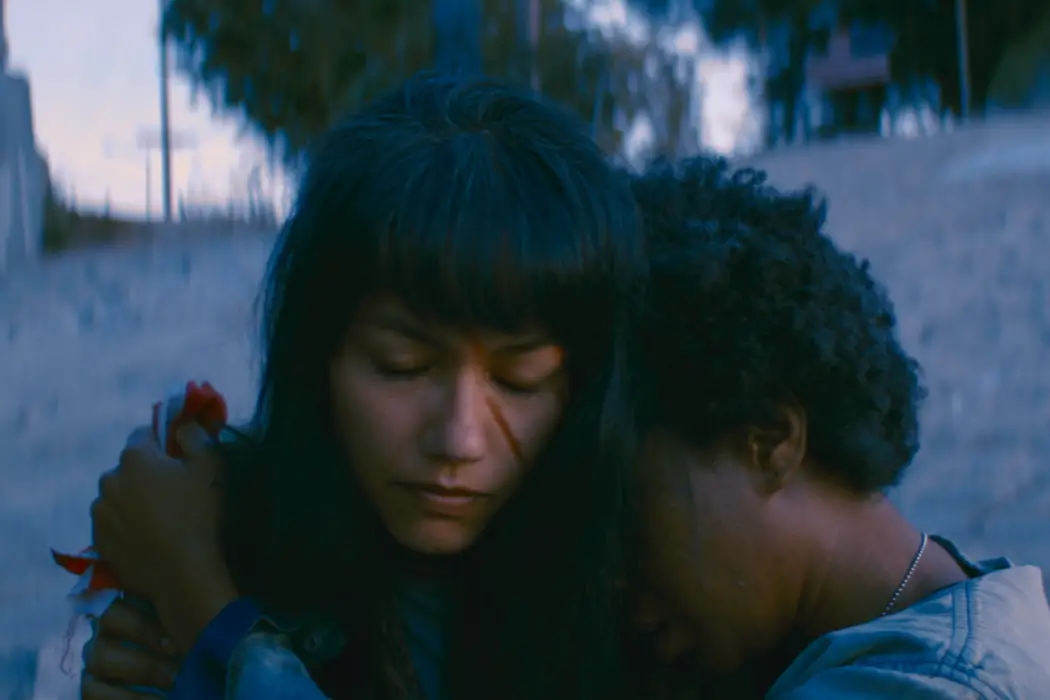
Stephanie Archer is 39 year old film fanatic living in…
The Tribeca Film Festival narrative shorts had everything one would expect – intrigue, heart, and catharsis – each wrapped in their own stories and each with their own voice.
Abducted (Ben Joyner)
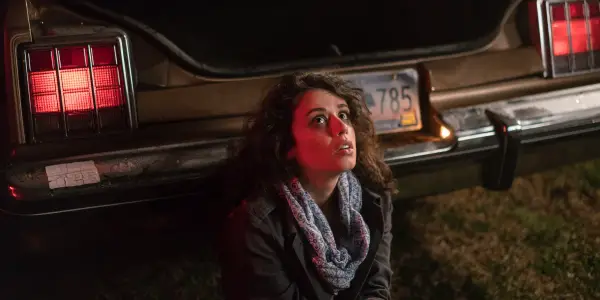
Each year, there is a short film that I wish had been a feature. There is a substance to it that can not be contained within the short film medium. Where ideas and storylines are introduced, a need for more only grows. This year, Abducted, from director Ben Joyner, fit the bill.
While the short itself is fine on its own, it was not one I was ready to leave behind following its conclusion. Abducted starts with two cops, one a vet named Dave (Jay DeVon Johnson) while the other, a young rookie named Jen (Jenna Kanell), responds to a missing persons call in the area. To their dismay, it is an elderly woman searching for her lost dog. While not a case of interest, there is still an evil lurking in the area.
As the two cops drive away, casually conversing about upcoming plans, fliers litter the phone poles, an unusual amount of missing persons photographed, pleading for information. With a strong visual basis, the intrigue builds. Though it is not long before viewers are introduced to the real threat, a predator searching for opportunity.
Later that night, as Jen is enjoying a first date, her mother calls. Knowing her mother will worry if she does not answer, she momentarily steps out, leaving her drink unattended. A rookie mistake, yet one easily accomplished through distraction and a desire to please others, the young cop opens herself to a much bigger threat.
It is always amazing how the short film medium can be so detailed, nuanced, and compressed, and Abducted delivers. There is a tension to the film, moments that will leave many reexamining their actions, thinking back to moments they innocently let their guard down. For others, it is a sharp warning as they leave their screening.
Yet, the short is not strictly about the choices and consequences, and those who are ready to strike when an opportunity is presented, it also brings everything full circle. No one gets away with anything, the universe has a way of calling those predators to justice – usually when they least expect it. The universe is always watching, and everyone will get what they deserve.
The Catch (Thais Drassinower)
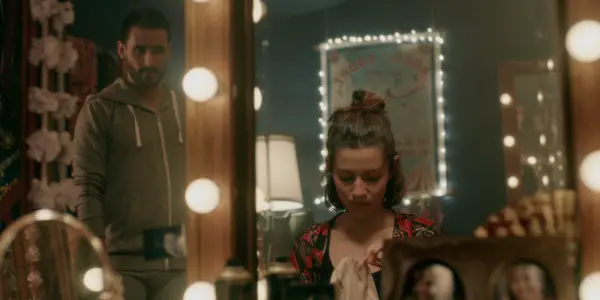
One of my favorite acts that inevitably always finds its 15 minutes of fame on America’s Got Talent are the trapeze artists. Pushed to their limits, each year presenting a new team and new risks, many that will have you holding your breath and gripping the arm of your couch. And with all the performances that have found their stage, there is one thing I have noticed over the years – many of the teams are in fact couples. With this knowledge, the intensity of their performance is only further heightened, the risks that much greater, and the potential devastation even more crippling. Not only are you risking your partner, but you are also risking your family. Enter The Catch.
As The Catch, from director Thais Drassinower, opens, we are introduced to our trapeze artists, their seductive, graceful and powerful performance while blindfolded drawing you into the skill and talent. While their practice session is abruptly interrupted, we quickly ascertain the relationship between the two and the future that potentially lies before them. While there is initially an excitement to fly, the short takes a dark turn when trust between the two artists comes into question.
Moments before they are about to give the performance of their lives, the husband (Oscar Meza) accuses Abril (Vania Accinelli) of cheating, the trust between a husband and wife forever broken – and the trust between performers forever in question. While he initially has concerns for her, her life in his hands, it quickly transforms into threats. Her life is in his hands, and if he goes out there, he has the power of revenge and control – only he can decide whether he will catch her. As Abril climbs the ladder, you feel your heart racing along with hers. Yet, as you are starting to grip the arm of your couch, the muscles tightening from the tension, you see the performer take over and the need for the show to go on come over Abril’s eyes as she launches into her performance.
Having watched AGT for years, and seeing the performances and the love shared between united artists, there was a heightened sense of danger and risk. To watch the relationship between these two degrade on screen, right before they are to perform is heartbreaking and terrifying. As anger escalates, you begin to question whether he really would “fail” to catch her, whether he could be overcome with blind rage.
There is an interesting contrast that is built, as they argue with the circus fanfare playing behind them, the performance audiences typically see contrast to the stark reality behind the scenes. The Catch is definitely a short that will captivate, leaving you squirming in your seat, uncomfortable the moment the heat begins to rise. Yet, you will not be able to look away.
Cru-Raw (David Oesch)
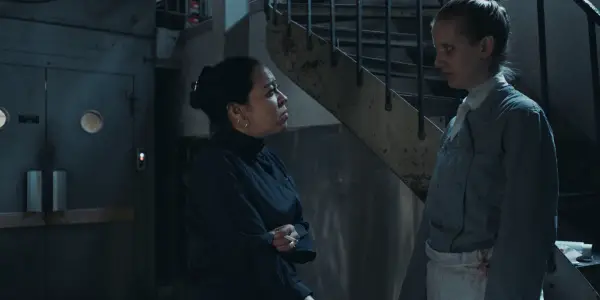
Are our successes defined by talent or through ambition and determination? This is the focus of the short film Cru-Raw, from director David Oesch, a short that is a snapshot into a young cuisinière’s (Jeanne Werner) apprenticeship as she stands on the precipice of success and failure. Where she is driven by perfection, those around her are driven by experience and superiority. Where they fight to stay where they are, she fights to climb the ladder. Surrounded by organized chaos, she tries to be perfect, finding success is in the smallest of details, yet in a kitchen as chaotic as this one, sometimes you need to cut corners to reach the end of the race.
As a disapproving Chef (Malika Kathir) commands the kitchen to redo all the work they have just completed, everyone is rushing to meet her satisfaction and expectation. As our young cuisinière is chopping, distracted for just a moment, she ends up badly cutting herself. Knowing that pulling out is not an option, she quickly tries to bandage her wound and make herself capable of continuing. Though as she struggles to compose herself and pull it together, the Chef comes out, showing interest in the young cook, revealing she is intrigued to see how far she can go. While the young cuisinière hopes that she has the talent to make it, the head chef rolls up her sleeves showing the scars she bears – the scars of her apprenticeship. As the young cuisinière begins to bleed through her glove, the superiority between them is vanquished for just a moment. They each on the same path, they each with the same spirit.
Imbued with a new sense of self-confidence and self-righteousness, the young cuisinière takes over the kitchen, making her own sauce, rather than one she has been tasked to make. Distracted once again for only a moment, a few drops of blood fall into the sauce, her realization too late as it is served to the restaurant’s patrons. While she is promptly scolded for disrupting the restaurant floor following her discovery, she is redeemed when her sauce is revealed to be the perfect sauce. It is in this moment you realize that her literal sweat and blood has gone into her profession, into her craft. You can not push forward without giving apart of yourself to the craft – to the art.
Blood and Glory (Satinder Kaur)
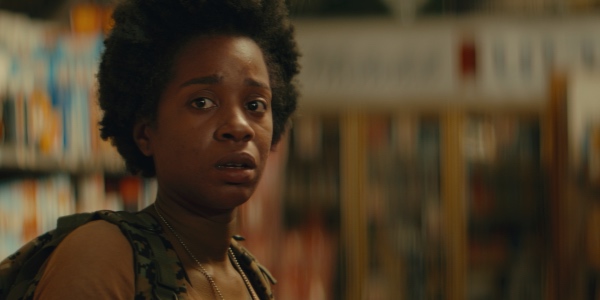
So many times throughout history, there are groups of individuals left behind, used, and then forgotten, left to face the world alone. Unfortunately, history has a habit of repeating itself, communities, societies, and individuals left to the wayside, only the faces are different. Blood and Glory, from director Satinder Kaur, gives audiences a look at the trials and tribulations facing many of our veterans when they return. Left homeless, lacking ample opportunities and mentally scarred, many find poverty and despair, the arms of a country closed to those who defended her honor.
Living in a tent on the side of the road, and struggling each day to not only survive but to do it with honor, Rosa and Jackie have been forgotten. When audiences are introduced, Jackie (Jomarla Melancon) is preparing for a job interview, the chance to finally escape, and begin leading a normal life on the horizon. Though Mother Nature has a different plan. Menstruating, with only scraps of rags to protect herself, Jackie puts on a brave face – only to find the job she was hoping for never existed.
A low point indeed, she is unrelenting, demanding to see the manager. But in her moment of resolution, she finds that taking care of herself goes beyond just acquiring employment. Requesting to use the restroom, she is denied as it is only for patrons. Taking a quarter from the “Donate to our troops’ bin” she is chased down by the employee, given no reprieve. “You stole from our troops,” he yells. “You don’t look like a veteran”. While her resolution was tested at the coffee shop, her honor finds the biggest test later on – one that could bear the biggest consequences.
There is a quiet brutality to Blood and Glory, a forceful push to open our eyes and see the abandonment that has befallen many of our troops. While we may have heard of the poor healthcare and difficulty with mental health, it is the naked vulnerability of these two women, who continue to uphold their core values, that truly strikes the heart. Even in their darkest moments, they refuse to give up hope, to back down, to betray themselves or each other.
In the final moments, attempting to help contain her menstruation, Rosa rips a piece of the American flag, handing it to her. In this moment, the entire picture comes into focus. Our veterans have bled for our flag, bled for glory, only to be cast aside. In their time of need and their time of recovery, we need to extend our hand to raise them up, to help them get back on their feet. We need to open our hearts and our arms to those whose honor and dignity give us all that they now lack.
Black Ghost Son (Christopher Low)

Hak Gwai – ”literally translates to ‘black ghost’, used to describe persons with dark skin complexion, typically Africans and African Americans. Often, but not always, used in a derogatory manner” This is the opening of Black Ghost Son, from director Christopher Low, setting a solid framework – especially as much of the film uses visuals to express its message.
In trouble for fighting at school, a young biracial boy named Troy (Kavon Lightsey) and his Chinese-American father Eddie (Gary Luk) make the long walk home, the young boy noticing he looks more like the black individuals around him rather than his father. Viewers are given little knowledge about the boy’s mother, the only information provided to us and to the young boy is that his mother was black. There is an interesting idea here as a young boy looks at these individuals at McDonalds, an idea of what families look like to children in comparison to friends, their attempt to understand the world around them formulating and evolving – both worldly and within their family context.
Like many children, Troy does not want the traditional Asian meal his grandmother (CeCe Anna Lee) has made him. He wants chicken nuggets. Many times in immigrant families, as one part of the family maintains the culture, typically the children want to embrace the world around them, what their friends and their families eat, play, and experience. Never mind immigrant families, this is true to all children no matter their family’s background.
As the short concludes, the father sees local black teens aggressively being arrested. As he watches, there is a sadness that creeps over his face, not necessarily for the teens at hand, but the world his son will have to face because of the color of his skin. His composure is betrayed shortly after as he is holding his son, his family his life. Everything becomes overwhelming for just a moment – the future that waits for his son and his seeming inability to relate or help.
It is a heartbreaking short to see a father faced with his son’s future and realizing that he may not be able to provide the support his son is going to need. As Troy is taking in the world and making his own observations, so too is his father.
The Black Veil (A.J. Al-Thani)
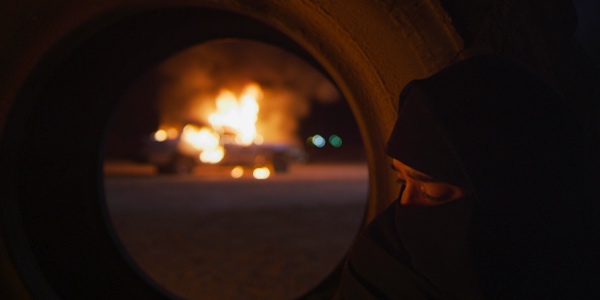
Too often we see the oppression, yet so few the freedom. The Black Veil, from director A.J. Al-Thani, gives viewers this chance, the chance to not only see freedom, but the journey to obtain it.
In parts of the Middle East, women are property, objects only to be looked upon by their husbands. Oppressed from birth, the future holds no hope of change. Hidden behind veils, cloaking their beauty, their emotions, they are black canvases of oppression. For Reem (Sana Al-Habib), however, this is not the life she desires to live. For Reem, the risk of escaping is worth the price.
The Black Veil looks at the things we are willing to do and endure for freedom. The problem with this short is not the short itself. It is the reality behind it. Time and time again, the oppression of women in this part of the world is documented. Time and time again, you hear of the brutal oppression and the dehumanization. But nothing changes.
You are happy for Reem but disheartened knowing how many other women have lost their lives for the same hope, in the same fight. And the battle is far from won. While there are some w, many will never see their sunrise. Many will not find the trust and loyalty Reem discovered on her journey.
Though with all of that said, this is why we need more content like The Black Veil, we need to be reminded that this oppression still exists, that there is still a battle to be fought. For each person who tries, no matter the outcome, there is hope for someone else that they too can make the journey. And hope spreads.
Carmentis (Antony Webb)
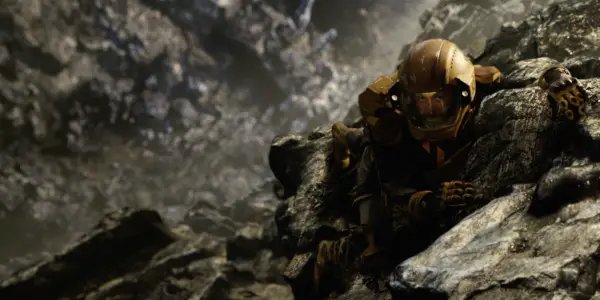
A solitary lifestyle can lead many to do things they would never consider otherwise. The void that solitude encompasses can swallow you up, leading to despair and a loss of hope. For some, it is too much to handle. For Mac (Ben Mortley), his moment of desperation leads to a renewed sense of life and a determination that pushes him past all odds – well that and Eve (Adriane Daff).
Having fallen down a cliff, injuring his spine, Mac revives consciousness, only to find his suit has immobilized him and called for help. Where the AI follows protocol, the young man knows help is unlikely to come and he will have to save himself. Disabling parts of the suite, he can move, agony rushing in, yet determination stronger. Climbing to the top of the cliff, Eve informs him he is not in a fight against his wounds, mental health, and medical attention, he is in a race against time as an eclipse is approaching – one that will kill all life.
Watching this moment from Carmentis, from director Antony Webb, I couldn’t help myself from remembering the “cliffs of insanity” from The Princess Bride, the masked man making the impossible feet of climbing to the top. While there was not a Spaniard waiting when he gets there, the cliff is not Mac’s final challenge. He finds it took longer to climb than he had expected, his time running out before the eclipse, the suit struggling to keep him alive against the cold. As the frozen air consumes, there are small luminescent creatures that fly into the darkness. Instantly, I can’t help myself thinking of the Abyss, the underwater creatures surround Mary Elizabeth Mastrantonio.
The influences continue, almost engulfing Carmentis, yet just staying afloat long enough to harmonize. A shot of his fist in the ground will have some calling back to Superman, others the Avengers. The music feels as though it was composed by Hans Zimmer as well, driving home the feeling of superhuman strength and overcoming all obstacles.
While you see the beauty of the film and its inspirations, you will find it hard to miss the overarching message of the film. Even in our darkest moments, the sun will always rise. Darkness is not forever. Whether it be the darkness of the mind, of our heart, or of our surroundings, it’s is “always darkest before the dawn “.
Egg (Michael J. Goldberg)

Egg, from director Michael J. Goldberg, was by far the most ridiculous short film of the entire festival – and I thank Tribeca for its inclusion. Utilizing an unending amount of movie clichés to propel its story forward, Egg is a story about, well, an egg. But let’s start from the beginning, as a young man sits, painfully listening to his date drone on, an hour had passed and her food remaining untouched. Her full plate of toast, hash browns, and eggs. While he tries to rush the brunch along, he finds himself focusing in on her wasted breakfast, how the journey of the eggs to her plate will have been in vain. As his thoughts ripple to the past, viewers will be clearly aware this is not your average short.
“Now that’s a good egg” a farmer declares as he pulls a perfectly pristine egg from the coop, placing it in the egg rack with the others. Loading up his truck with his regular delivery, he is stopped in the road, a Gus Fring Breaking Bad moment threatening to unfold at any moment. When the farmer admits he can not make the payment he is overdue, his eggs suffer the price, the henchmen shooting the stacks to yolky remnants – except for one egg. As the bad guys drive off, the farmer saves the one egg from falling off the truck, subsequently leaving it on the side of the road in the hopes that it will have a better life. What ensues from here is a wild adventure including hitchhiking, love, saloons, and revenge, all culminating into an epic wrap around to the short’s initial character – who sees his concerns regarding his date’s wasted eggs are more than what they appear to be.
Egg is a mosh pit of movie hysteria, hilariously strewn together for the pure enjoyment of an audience. And the hilarity does not only come from the movie clichès alone, as the short is littered with egg puns throughout its entirety (“A real scrambler”, “Where you heading hollandaise?”). I even found myself joining the fun, making egg puns of my own. Couple all of this with a score that resonates with the unmistakable power of the Avengers and you have one epic short film. If you have the chance to see Egg, do it. It’s Egg-cellent!
Grey Zone (Gal Sagy)
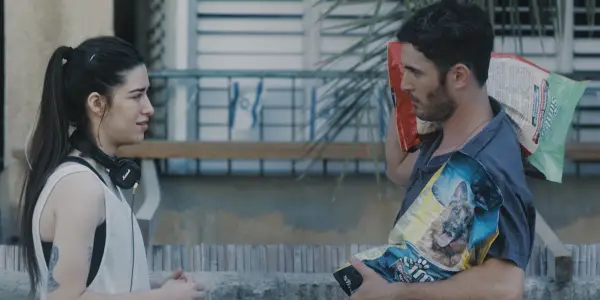
In a #Metoo era, women all over the world have found their voices. Inspired by the bravery of a few, women have the courage themselves to stand up to their assailants and abusers, to say no, and to be heard. Grey Zone looks at the bravery of the up and coming generation, those who have grown into the power of women, taught that you don’t have to continue as nothing happened.
Grey Zone, from writer and director Gal Sagy, opens to beautiful camera work and cinematography, the lens capturing the youth and beauty of a young teenager named Neta (Rachel Yaron) out for a run. The lighting is soft and airy, that is until while crossing the sidewalk a man (Udi Persi) touches her, somewhat aggressively, without consent. While she stands there in the middle of the crosswalk determining what she should do, she turns to follow the man, hard-pressed to speak with him about the incident.
It is empowering to see her walk right up to the man who touched her, refusing to back down and refusing to accept his accusations that she is confused. She is cool-headed, yet persistent. While not willing to report him, she wants him to admit what he did, to explain to her why he thought it was appropriate or that he even could.
What is really striking is the assailant’s face and reactions. While at first, he brushes her off, he becomes angered, all before the fear and worry sets in. She has stripped him of his power over her, forcing him to not only look at what he has done but all that he could lose – those in his life that could come to look and think differently of him.
Grey Zone is a powerful short film that resonates in layers, each ripple hitting more effectively than the last. It is a #Metoo evolution moment, where a woman, no matter her age or status, can demand answers, demand a reexamination of behavior. While there is a nervousness that accompanies, there is persistence and resilience. A refusal to put up with the behavior and a refusal to excuse.
For more information about this year’s Tribeca programming, click here.
Does content like this matter to you?
Become a Member and support film journalism. Unlock access to all of Film Inquiry`s great articles. Join a community of like-minded readers who are passionate about cinema - get access to our private members Network, give back to independent filmmakers, and more.













